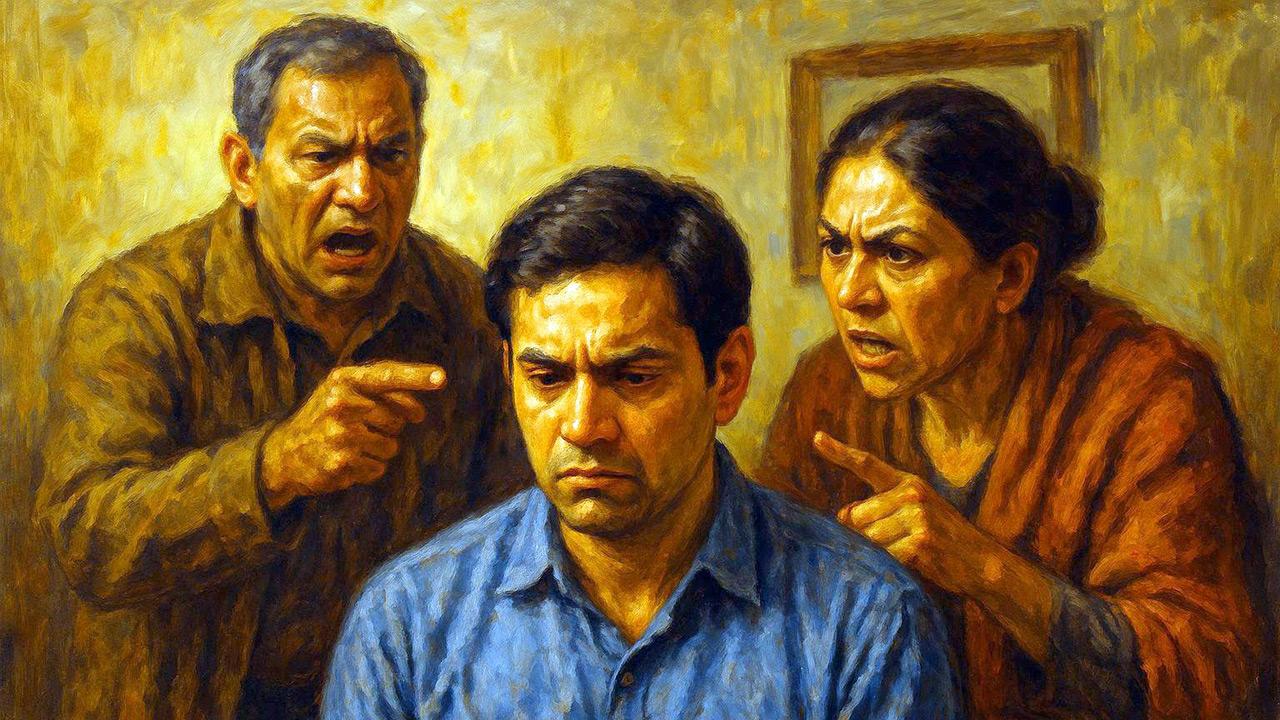When your ungrateful offspring calls you a bad parent, gaslight them with one of these techniques, developed by the tobacco, alcohol and pharmaceutical industries

Gaslighting is one of the most popular pastimes in the world today, in which people tell those who challenge them that they are full of it, and whatever they believe, it’s utter nonsense. Illustration by C Y Gopinath using AI
You never thought it would come to this. You always believed you gave your children the best possible upbringing, raising them in the grand Indian tradition where papa knows best, mama does the heavy lifting and children speak only when spoken to. These are Indian cultural values, the best in the world. You might even have suggested that Indians are a master race, and that your offspring could become famous and rich one day like you if they followed your advice. From time to time, of course, you might have cracked the whip a little too hard. That’s tradition too.
But now they’re 28 and they’ve ghosted you, blocked you on WhatsApp, and openly call you bad and abusive parents to your face, saying you traumatised them, retarded their growth and destroyed their self-esteem, all after you put them through a costly education at Yale or Oxford.
What bosh! you think to your wife. We were never like that. We gave them our best. What you want is their gratitude and appreciation. Instead, they’re giving you punishment and estrangement.

Let’s talk about Bombai. Click the QR code above to join my WhatsApp group to share your Bombai stories for my book—and perhaps answer some of my Bombai questions.
Admitting you made any mistakes would be a disaster. Parents are not supposed to apologise to their children. Acknowledge one misdemeanour and you’d be on a slippery slope and next thing you know, it would be off to the gallows. The right decision is to stand your ground and tell your uppity offspring what’s what.
This is a perfect time to gaslight your child. Gaslighting is one of the most popular pastimes in the world today, in which people tell those who challenge them that they are full of it, and whatever they believe, it’s utter nonsense. When done well, gaslighting eventually makes the other person feel small, doubt themselves, lose weight, sleep poorly and wonder if they need therapy. It’s a classic Win-Lose situation and a great way to come out as a winner even when you’re wrong.
You can gaslight your rebellious offspring by using one of the techniques below, all of which have been developed and perfected over decades by the tobacco, alcohol and pharmaceutical industries. Trust me, your child will be gup-chup.
Theme 1: This isn’t abuse. It’s culture.
Argue that there’s no one right way to raise a child, and strict or controlling behaviour is part of the Indian tradition. Dismiss emotional abuse as a Western concept. Example: In our culture, we don’t have these ideas of emotional boundaries. We show love by controlling you.
Go after the psychologists and counsellors who are stuffing your children’s heads with half-baked TikTok theories and pop psychology. Example: It’s easy to label your parents as toxic. But have you ever raised a child in real life?
Dismiss outside opinions as misinformed, exploitative, irrelevant or disrespectful of Indian values. These foreign-educated therapists don’t understand Indian family systems. They’ll make you hate your own parents. Use the classic fallback: “How can you question our intentions?” Example: We are your parents. We always know best.
Theme 2: No big deal. This happens in every family.
Justify control, manipulation or verbal put-downs by labelling them as rare and only used when the child was really “asking for it”. You got angry only when the child was disrespectful or disobedient. Example: We were strict only when necessary.
Invoke the majority experience. Being scolded or slapped really hard is part of every Indian child’s life. And if Indian parenting was so bad, how come everyone is so awed by Indians? Example: Give me a break. This is how every Indian child grows up.
Cautiously admit some minor mistakes, but quickly add that it came out of concern and worry. Example: Maybe we were too harsh sometimes. But we did it because we cared for you.
Treat the whole discussion as making a mountain out of a molehill. So what if you once called them a failure? It’s not like you meant it. Example: You’re overreacting. Don’t be so sensitive.
Deflect attention by pointing out that the world has much bigger problems, like poverty and climate change. This will make them feel trivial by comparison. Example: At least we didn’t abandon you. You had food, a place to sleep and a great education.
Theme 3: We did it for your good.
Reframe abuse as character-building. Tell them life isn’t a bed of roses, and they should thank you for preparing them for the real world. Example: Some emotional pressure is good for you. It builds resilience.
Remind them that other children have gone through much worse. At least you didn’t lock them up in a cage in a dungeon and starve them. Example: We never hit you as hard as our parents did. Be grateful.
Theme 4: Good Indian families don’t work like that.
Point out that they’ve lost their Indian-ness and become too Westernised. Maybe you should have sent them to Kirori Mal College instead of Cambridge. Example: Only in America do children talk back to parents like this.
Show horror that they could even entertain the thought that they were abused. Tell them they’re being brainwashed and imagining problems where there were none. Example: You’ve been watching too many Instagram reels.
Jai Hind.
You can reach C Y Gopinath at cygopi@gmail.com
Send your feedback to mailbag@mid-day.com
The views expressed in this column are the individual’s and don’t represent those of the paper.
 Subscribe today by clicking the link and stay updated with the latest news!" Click here!
Subscribe today by clicking the link and stay updated with the latest news!" Click here!








